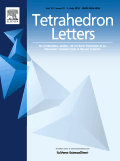
TETRAHEDRON LETTERS
Scope & Guideline
Connecting Researchers with Cutting-Edge Discoveries
Introduction
Aims and Scopes
- Synthetic Methodologies:
Research that develops and optimizes synthetic routes for organic compounds, including novel reactions, catalysts, and conditions. - Organocatalysis:
Studies centered on the use of organocatalysts in various organic transformations, emphasizing green chemistry and sustainability. - Medicinal Chemistry:
Investigations into the synthesis and biological evaluation of compounds with potential pharmaceutical applications, including anticancer and antimicrobial agents. - Material Chemistry:
Research focused on the synthesis and characterization of new materials, including polymers and nanocomposites, with applications in electronics and photonics. - Natural Product Synthesis:
Total syntheses and synthetic strategies for complex natural products, exploring their biological activities and medicinal applications. - Photocatalysis and Electrochemistry:
Studies that utilize light or electrochemical methods to drive organic reactions, promoting efficiency and selectivity in synthesis. - Heterocyclic Chemistry:
Research dedicated to the synthesis and functionalization of heterocyclic compounds, which are crucial in pharmaceuticals and agrochemicals. - Mechanistic Studies:
Investigations into the mechanisms of chemical reactions, providing insights that can guide the development of new synthetic methods.
Trending and Emerging
- Sustainable and Green Chemistry:
There is a growing emphasis on sustainable practices, including the use of renewable resources, waste reduction, and energy-efficient processes in organic synthesis. - Photoredox and Electrochemical Catalysis:
Research involving photoredox catalysis and electrochemical methods has surged, highlighting innovative approaches to organic transformations under mild conditions. - Asymmetric Synthesis and Catalysis:
There is an increasing number of studies focused on asymmetric synthesis, particularly involving novel chiral catalysts and methodologies that enhance enantioselectivity. - Artificial Intelligence in Synthesis:
Emerging interest in integrating AI and machine learning techniques into synthetic organic chemistry to predict reaction outcomes and optimize synthetic routes. - Bioorthogonal Chemistry:
The development of bioorthogonal reactions that facilitate the labeling and tracking of biomolecules in live systems is gaining traction, particularly in medicinal chemistry. - Nanotechnology in Drug Delivery:
Research exploring the use of nanomaterials for drug delivery systems is on the rise, reflecting the interdisciplinary nature of modern chemical research. - Functionalization of Natural Products:
There is an increasing trend toward the functionalization and modification of natural products to enhance their biological activity and potential therapeutic applications.
Declining or Waning
- Traditional Metal Catalysis:
While metal-catalyzed reactions remain important, there has been a noticeable decline in studies focusing solely on traditional metal catalysts, as researchers increasingly explore greener and more sustainable alternatives. - Conventional Organic Solvents:
Research emphasizing the use of traditional organic solvents has decreased, with a growing preference for solvent-free or environmentally friendly methods being favored. - Two-Dimensional Materials:
The focus on synthesis and applications of two-dimensional materials, such as graphene and transition metal dichalcogenides, has waned as interest shifts towards more complex and functional materials. - Biological Mechanisms of Action:
Research papers dedicated solely to elucidating the biological mechanisms of action of compounds without a strong synthetic component seem to be less frequent.
Similar Journals
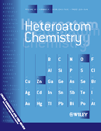
HETEROATOM CHEMISTRY
Transforming Research: The Essence of Heteroatom ChemistryHeteroatom Chemistry is a prominent open-access journal dedicated to advancing the field of heteroatom chemistry, with a particular focus on the chemistry of elements other than carbon in organic compounds. Published by Wiley-Hindawi, this journal provides researchers, professionals, and students with a platform to disseminate and access novel research findings related to the synthesis, properties, and applications of heteroatom-containing compounds. Since its inception in 1990 and gaining open access status in 2019, the journal has fostered academic collaboration and innovation throughout its converged years, although it currently holds a category quartile ranking of Q4 in Chemistry (miscellaneous) and ranks #319 out of 408 in general chemistry within Scopus. With its commitment to high-quality research and broad accessibility, Heteroatom Chemistry is poised to be an essential resource for anyone looking to explore the rich and varied applications of heteroatom chemistry in diverse scientific fields.

INDIAN JOURNAL OF HETEROCYCLIC CHEMISTRY
Innovating the Future of Organic ChemistryINDIAN JOURNAL OF HETEROCYCLIC CHEMISTRY, published by CONNECT JOURNALS, is a vital resource in the fields of organic chemistry and biochemistry, aiming to advance research and promote innovation within the realm of heterocyclic compounds. Established in 1996, this journal has successfully converged into an influential publication with a commitment to disseminating high-quality, peer-reviewed research articles that enhance the understanding of heterocyclic chemistry applications. Although it currently holds a Q4 quartile ranking in both biochemistry and organic chemistry according to the 2023 categorizations, its broader contributions to the scientific community should not be underestimated, as it seeks to support the ongoing dialogue among researchers, professionals, and students. The journal operates from Ghaziabad, India, providing open access to its publications, thereby fostering a collaborative and informative environment for its international readership. With an ISSN of 0971-1627 and a special focus on contemporary challenges and developments in the field, the INDIAN JOURNAL OF HETEROCYCLIC CHEMISTRY is poised to make a significant impact as it continues to evolve through 2024 and beyond.

JOURNAL OF HETEROCYCLIC CHEMISTRY
Connecting Research to Real-World ApplicationsJournal of Heterocyclic Chemistry, published by Wiley, stands as a key resource in the field of organic chemistry, offering in-depth research articles and insights spanning from 1966 to 2024. With its strong Scopus ranking of #83 out of 211 in the Organic Chemistry category, placing it in the 60th percentile, the journal maintains its significance and relevance within the academic community. Although it does not currently offer open access options, it provides extensive coverage of heterocyclic compounds, which are vital to various applications in pharmaceuticals and material sciences. The journal's commitment to high-quality research is further reflected in its classification as Q3 in the 2023 quartiles for Organic Chemistry. Researchers, professionals, and students alike will find valuable contributions to the intricate studies of heterocycles, enhancing their understanding and exploration of this fascinating area of chemistry.

ACS Organic & Inorganic Au
Empowering Global Knowledge Exchange in ChemistryACS Organic & Inorganic Au, published by the American Chemical Society, stands as a premier open-access journal dedicated to advancing the fields of organic and inorganic chemistry. Since its inception in 2021, this journal has swiftly risen to prominence, achieving a commendable Q1 classification in Inorganic Chemistry, Organic Chemistry, and Physical and Theoretical Chemistry as of 2023. With an ISSN of 2694-247X, it provides a vital platform for researchers, professionals, and students to disseminate their findings and engage with cutting-edge work across converged disciplines. Operating from its headquarters in Washington, DC, ACS Organic & Inorganic Au is committed to fostering a collaborative research environment, encouraging rigorous peer review, and ensuring the wide accessibility of high-quality scholarly articles. With its open-access model, readers worldwide can freely access and utilize research findings, promoting a global exchange of knowledge crucial for driving innovation in chemistry.

ARKIVOC
Fostering Global Collaboration in Organic Chemistry ResearchARKIVOC is an esteemed open-access journal dedicated to the field of Organic Chemistry, published by ARKAT USA INC. Since its inception in 2000, ARKIVOC has aimed to disseminate high-quality research and advancements in organic chemistry, fostering an international exchange of knowledge within this ever-evolving discipline. With its ISSN 1551-7004 and E-ISSN 1551-7012, the journal is committed to providing accessible content free of charge to researchers, students, and professionals around the globe. Although currently categorized in the fourth quartile of Organic Chemistry with a Scopus rank of #188 out of 211, ARKIVOC continues to encourage the publication of innovative works and critical reviews that highlight emerging trends and methodologies in organic synthesis, reaction mechanisms, and material sciences. Its open-access model since 2000 ensures that valuable contributions to scientific knowledge are widely available, promoting collaboration and discovery. The journal is based in the United States, with its editorial office located at the University of Florida, under the guidance of prominent chemists. ARKIVOC provides an essential platform for those deeply engaged in organic chemistry research, supporting the advancement of science for future generations.
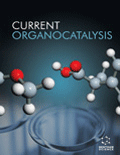
Current Organocatalysis
Unveiling Innovations in Organocatalytic ResearchCurrent Organocatalysis is a premier academic journal dedicated to the dynamic field of organocatalysis, published by Bentham Science Publishers, Ltd. Based in the United Arab Emirates, this journal has been a valuable resource for researchers since its inception in 2014 and will continue to publish impactful articles until 2024. The journal provides a platform for sharing groundbreaking research, reviews, and insights that significantly contribute to the fields of Analytical Chemistry, Catalysis, and Organic Chemistry. With a Q4 ranking in several chemistry categories, it identifies and disseminates emerging strategies and methodologies in organocatalysis, promoting collaboration and advancement in the community. While it operates on a subscription basis, the journal ensures accessible content for its audience to further supplement academic learning and professional development. Researchers, professionals, and students are encouraged to explore and contribute to this critical field, leveraging the journal as an essential resource for the latest trends and innovations in organocatalysis.
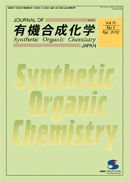
JOURNAL OF SYNTHETIC ORGANIC CHEMISTRY JAPAN
Fostering collaboration in the realm of organic chemistry.JOURNAL OF SYNTHETIC ORGANIC CHEMISTRY JAPAN, published by the SOCIETY OF SYNTHETIC ORGANIC CHEMISTRY, JAPAN, is an esteemed publication specializing in the dynamic field of organic chemistry. With a rich history dating back to 1944, this journal aims to disseminate pivotal research findings and innovative methodologies in synthetic organic chemistry, fostering collaboration and knowledge exchange among researchers and professionals. Although it currently holds a modest ranking in the Q4 quartile for organic chemistry, its commitment to advancing the discipline remains steadfast. The journal primarily caters to scholars and students seeking to delve deeper into organic synthesis, highlighting original articles, reviews, and methodological studies. While access to the journal is not open, its contributions to the field are essential for anyone invested in understanding the complexities of organic chemistry. We invite you to explore the journal's offerings and enhance your expertise in synthetic organic processes.

EUROPEAN JOURNAL OF ORGANIC CHEMISTRY
Empowering Discovery in Organic ScienceThe EUROPEAN JOURNAL OF ORGANIC CHEMISTRY (ISSN: 1434-193X; E-ISSN: 1099-0690), published by WILEY-V C H VERLAG GMBH in Germany, stands as a crucial platform for disseminating innovative research in the fields of organic, physical, and theoretical chemistry. With its inception dating back to 1998 and converging expertise until 2024, this esteemed journal has achieved a notable reputation, earning a Q2 rank in both Organic Chemistry and Physical and Theoretical Chemistry categories as of 2023, indicating its vital contribution to the academic community. Researchers and professionals will benefit from its rigorous peer-reviewed articles, which foster advancement in chemical sciences, while students can leverage its wealth of knowledge to enhance their learning. Although currently not an open-access journal, the content produced is invaluable for those looking to stay at the forefront of chemical research.
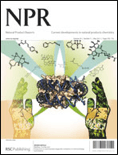
NATURAL PRODUCT REPORTS
Unveiling Innovations in Natural Product ScienceNATURAL PRODUCT REPORTS, published by the Royal Society of Chemistry, is a premier interdisciplinary journal that specializes in the field of natural product chemistry. With an impressive impact reflected in its 2023 quartile rankings, it holds a Q1 status in key categories including Biochemistry, Drug Discovery, and Organic Chemistry, highlighting its significance and influence in these areas. The journal, which has been disseminating groundbreaking research since its inception in 1984, serves as a vital resource for researchers, professionals, and students dedicated to advancing the understanding and application of natural products in various scientific contexts. Although it does not offer open access, the journal provides a plethora of insightful reviews and seminal articles that contribute to the collective knowledge and innovation within the natural product community. With a commitment to excellence, NATURAL PRODUCT REPORTS continues to foster collaboration and inspire future breakthroughs in the field.
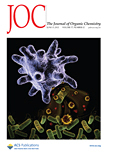
JOURNAL OF ORGANIC CHEMISTRY
Exploring the Depths of Organic Chemistry KnowledgeJournal of Organic Chemistry, published by the American Chemical Society, is a prestigious peer-reviewed journal dedicated to advancing the field of organic chemistry. With an ISSN of 0022-3263 and an E-ISSN of 1520-6904, this journal has established itself as a key platform for disseminating high-quality research since its inception in 1936. Residing in the Q2 category for Organic Chemistry as of 2023, it ranks #64 out of 211 in Scopus, positioning itself within the top 69th percentile of its field. Researchers and professionals can access vital findings and innovative methodologies that drive the understanding and application of organic chemical principles. Although the journal is not open access, it remains a crucial resource in academia and industry, contributing significantly to the scientific community's knowledge base. For detailed insights and cutting-edge research, the journal continues to be an essential read for those engaged in the dynamic and evolving landscape of organic chemistry.